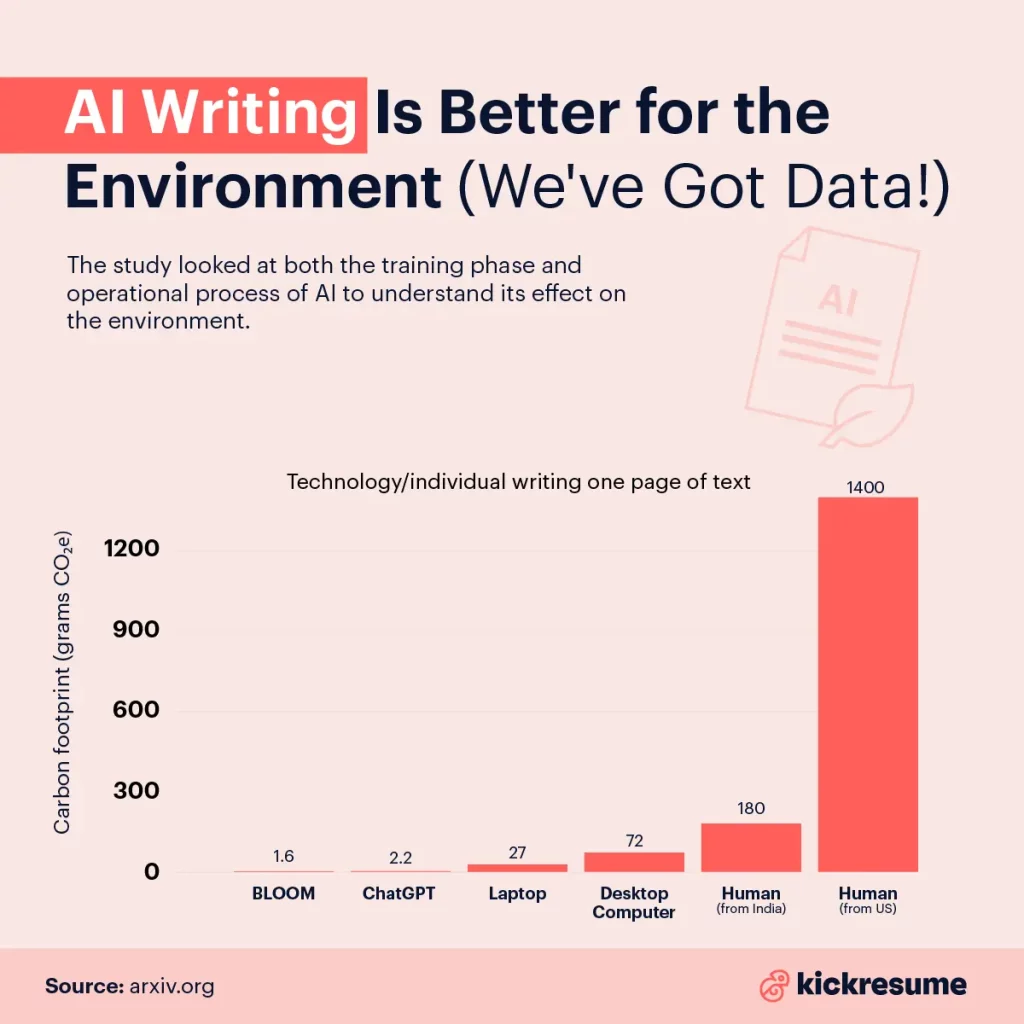AI Writing Is Better for the Environment (We’ve Got Data!)
As the AI revolution keeps surging ahead, we often find ourselves in a race with machines (us mostly losing). And it’s not just a battle of skills — apparently, it’s also a race towards a greener future.
Let’s shine a spotlight on some burning questions: Between AI and humans, who writes with lesser carbon in their wake? And what’s the scoreboard actually looking like?
A recent study called “The Carbon Emissions of Writing and Illustrating Are Lower for AI than for Humans” reveals that the carbon emissions from AI text generators such as Bloom and ChatGPT are by far lower than those of humans. And when we say “by far”, we’re talking difference on a Grand Canyon spread kind of far.
Humans outdone: AI writing emits 130-1500 times less carbon
In the duel of AI vs Human writing, here’s how they weigh in on the scale of carbon emissions:
- ChatGPT: The combined carbon emissions from training and operating come in at roughly 2.2 grams of CO2e per query — that’s less than the weight of a small paperclip!
- BLOOM: Considering the same level of usage, BLOOM’s combined impact of training and per-query cost hits an even lower number — around 1.6 grams of CO2e per query.
- US resident: Imagine you’re an American who writes a page of text — let’s say 250 words — in an hour. By doing this you actually generate around 1400 grams of CO2e — that’s your carbon footprint for writing that page.
- Indian resident: To put things in perspective, let’s hop over to India, a country with one of the lowest per capita carbon impacts among populous nations. An average resident’s annual carbon footprint? Roughly 1.9 metric tons translating to around 180 grams of CO2e per page. Quite the contrast!
- Using a laptop for about 0.8 hours to write a page makes 27 grams of CO2e, while a desktop emits 72 grams of CO2e for the same time.
The main point here? When it comes to cutting down a carbon footprint, AI text generators ace the game by emitting 130 to 1500 times less CO2e per page of text.
Seeing the whole picture — the untold social impacts
It’s worth noting that the study doesn’t delve into social aspects like job loss, legal issues, or increased demand for AI services when focusing on emissions.
Instead, it takes a rather simplistic view. It also assumes that the quality of AI-generated text is up to snuff for any given task.
Now, on the face of it, this seems a bit like comparing apples to aircraft carriers. After all, us humans need to eat, sleep, and exist somewhere — which naturally makes our footprint a bit beefy.
So, you could argue that the odds were stacked in favor of AI from the get-go. But the result, as plain as it seems, gives us a fresh viewpoint on how we tackle carbon emissions.
The study actually suggests harmony over rivalry — where AI’s efficiency couples with human creativity. It’s still good old teamwork, but with a tech twist.
For example, a writer may initially team up with AI. The process can begin with AI brainstorming ideas and crafting an outline. Once a promising draft takes shape, the human writer steps in to edit the text, lending their unique voice to the AI’s text.
And now we know that it’s not just time-savvy but also good for the environment!
Craving more stats? Check out more of our insightful data on today’s job market!



